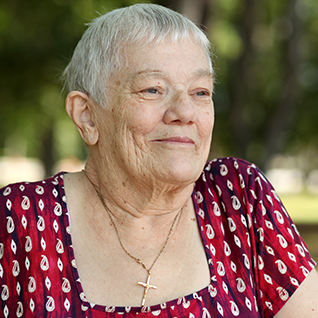
LATEST NEWS
Marian works in an open-plan office. She is a mid-level manager with a Queensland Government agency. Her colleagues believe she ‘has life all worked out and will keep climbing the corporate ladder.’ When Marian is at work, the mask can never slip.
Because her physically and emotionally abusive husband is just a couple of cubicles up.
In Australia, an estimated 2.2 million women and 1.4 million men have experienced coercive control in their relationships. This has been in the media throughout the past two years, with the families of victims advocating for criminalisation of this form of abuse. It is often the hardest to prove, and in many cases, victims are left questioning their own understanding of events and their response to situations.
When Marian met Paul, they were both new to the office. As a young bride, more than a decade ago, Marian didn’t recognise the signs of coercive control. “At first, I thought he was just possessive but over time, I lost touch with friends and family. At work, Paul insists we have lunch together every day. He analyses my behaviour and interaction with teammates, criticising my responses in meetings, and asserting his expectations for the rest of the day. His job gives him access to staff emails, and he comments on my
emails to colleagues and friends. He checks my phone and interrogates me about messages and contacts.
One of our senior Centacare managers, Alicia, who is on the frontline of domestic and family violence services, tells us they are seeing more and more similar cases. Alicia says that “at least 60 per cent of women who have, or are currently, experiencing domestic violence, are in the workforce. They never confide in their employers or colleagues because they fear the stigma and feel ashamed.”
For Marian, the abuse only became worse over time. “Our first son was born two years after we got married. My mother came up to Queensland to stay with us and help me with the baby. I remember the day she flew back. We arrived home from the airport, and I knew that Paul had been agitated and angry for just about the whole time she was with us. I put the baby in his cot, and as I stepped out into the hall, Paul was there waiting. I instantly understood that the violence that had been brewing for years was about to come to a head. That was the first time he hit me.”
Today, Marian and Paul have three children. Despite working and earning an income, she has no control of their financial situation as Paul insists that he manages their finances. She has a ‘food and emergencies’ card, which he monitors and she is required to account for. The children know to ‘ask daddy’ if they want to go somewhere, buy something, or need permission for anything.
“They come to me for affection, and everyday things like packing lunches and doing the washing, but even as young as they are, they understand that I have no real power or influence within our family. I am only a small step higher than them in the food chain.”
People often ask “why does she stay” when they hear about situations like Marian’s. The answer is complex, and different for each woman. In this case, Paul has weaponised their children against her, openly criticising her parenting and ability to care for the family. The children know he is violent, but they have also been taught their mother deserves to be treated badly because she is a bad mother and doesn’t care for them the way a ‘proper’ mother should.
Marian tells us: “Without the mask, I feel exposed and vulnerable, but with it, I feel completely alone. I have lost my dignity in the relationship, and if I tell others what is going on, I will also lose my career. I will not be able to work anywhere related to my current field because Paul is well-known throughout the industry and will poison people against me. If we leave, he will come after me and has threatened to kill me. I am afraid of him, and I don’t want to live without my children. So instead, I live with this mask. I let people think our life is perfect, and our relationship is good. I die on the inside, so that I can be present for my kids on the outside.”
Last month, while out doing the weekly shopping, Marian saw a Centacare office and made the decision to walk in. After almost 15 years of mental, emotional, and physical abuse, she was able to tell someone that she is a victim of abuse.
- She asked for help. She removed her mask in the presence of strangers, and she sobbed with a combination of fear and relief.
Now, she needs your help. Marian is not ready to leave, because she fears for her safety and that of her children. She has no access to money, and knows that despite being an educated professional, she will struggle financially. She knows Paul will fight her for custody of the children, to punish and hurt her. Her work situation adds a layer of complexity because their personal life could explode into the workplace, and her feelings of shame are closely tied to what her colleagues would think of her and what they would think of Paul.
Through your help, Centacare will help Marian find crisis accommodation as soon as she tells us she is ready to leave the relationship. With your support, we have counsellors ready to help her and her children. Through our work with the Queensland Police Service and Child Safety, we can support her in Court and give her the best possible chance of a safe and secure future.
“So many times, I thought about resigning, about leaving. But I am so afraid of the emotional and financial repercussions. Paul is a well-known and respected member of our community. What will happen to our children if I leave? Will they also become targets of emotional and physical abuse from their father? Will they grow up thinking their mother doesn’t love them, and is a bad person for leaving?”
If you are able to help local families in need escape violence and fear, please make a tax-deductible donation to Centacare today.
Will you give women like Marian a safe space to remove the mask?
Yours sincerely,
Anick de Réland
General Manager, Specialist Family and Support Services
Centacare Family and Relationship Services



